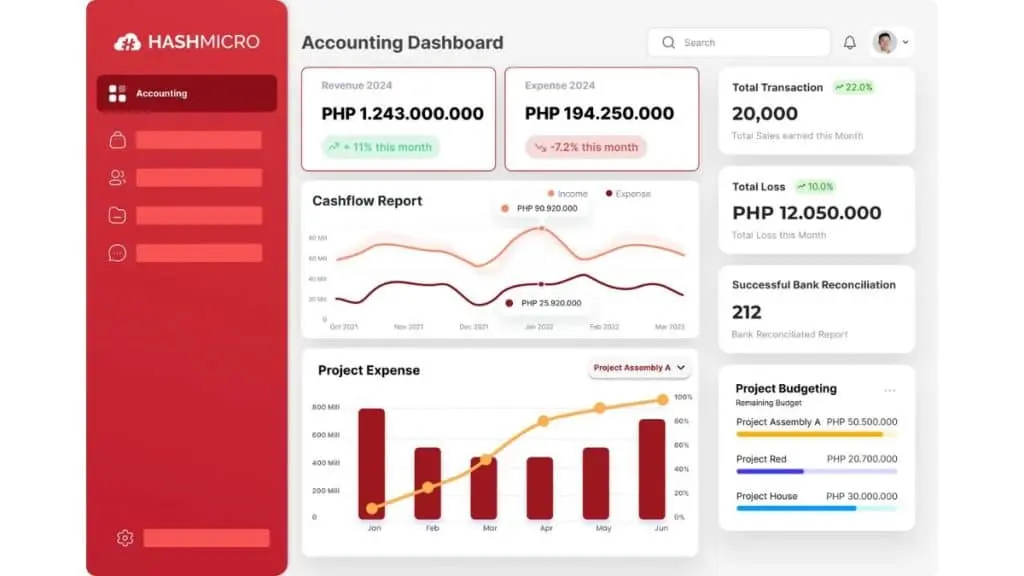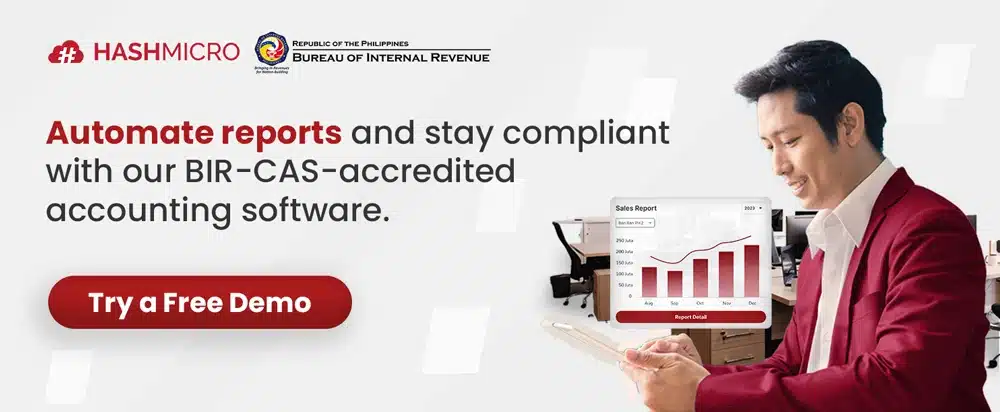Are you struggling to manage corporate finances efficiently? Do regulatory compliance and complex financial reporting slow down your business operations? Many companies face challenges in tracking transactions.
If these issues are overlooked, they can disrupt financial reporting and decision-making. However, the solution to your problem is using accounting software to manage financial data. Automating reporting, monitoring cash flow, and ensuring compliance help save time and minimize errors.
The right accounting solution improves efficiency and accuracy by enhancing record-keeping and streamlining financial management. Discover how HashMicro’s accounting software can help maintain financial integrity and i–optimize ang iyong mga operasyon sa korporasyon!
Table of Contents

Key Takeaways
|
What is Corporate Accounting?
Corporate accounting is a branch of accounting that focuses on a company’s financial activities. It includes recording, summarizing, and reporting financial data conveyed to business stakeholders over time.
The main objective is to ensure the accuracy and relevance of financial information, enabling businesses to make well-informed decisions, develop effective strategic plans, and maintain financial stability while complying with regulatory requirements.
Corporate accounting also plays a crucial role in fostering transparency and accountability within a company. By maintaining well-structured financial records, businesses can build trust with investors, regulatory bodies, and other stakeholders.
What are the Different Types of Corporate Accounting?
Understanding the different types of corporate accounting is crucial for effective financial management. Each type serves a distinct purpose and is key in maintaining accurate financial records, ensuring compliance, and supporting business growth.
To understand their functions and significance better, let’s explore the key differences between corporate, financial, and public accounting.
1. Corporate accounting
Corporate accounting manages a company’s internal financial activities, focusing on financial planning, record-keeping, and reporting. It involves preparing financial statements, managing budgets, overseeing tax compliance, and ensuring accurate financial data for internal decision-making.
Unlike other types of accounting, corporate accounting supports business operations by analyzing financial performance, optimizing resources, and ensuring regulatory compliance. It helps companies maintain stability and growth plans to make informed strategic decisions.
2. Financial accounting
Financial accounting creates financial statements for external stakeholders like investors, creditors, and regulators. It records and summarizes transactions, tracks past-due payments, and prepares reports such as income statements, balance sheets, and cash flow statements.
Transparency in financial reporting is key to maintaining investor trust and regulatory compliance. Financial accounting ensures accuracy and adherence to legal standards, supporting accountability and informed decision-making.
3. Public accounting
Public accounting involves professionals working for firms that provide financial services to multiple clients rather than a single corporation. Their work includes auditing, tax preparation, and financial consulting to ensure compliance with regulations.
Public accounting firms hire multiple accountants to serve various clients. Some offer full financial services, while others specialize in tax-related work, helping businesses maintain transparency and meet legal requirements.
Importance of Corporate Accounting

Corporate accounting is essential for maintaining a company’s financial health and ensuring compliance with regulatory standards. It plays a crucial role in recording, analyzing, and reporting financial transactions, which helps businesses operate efficiently and make informed decisions.
In the Philippines, businesses are legally required to disclose their financial statements to regulatory bodies to ensure compliance with financial laws. Corporate accountants handle this responsibility by preparing reports meeting regulatory and industry requirements. Their work ensures businesses remain legally compliant, avoid penalties, and maintain investor confidence.
Beyond compliance, corporate accounting provides valuable financial insights that help businesses plan for the future. It forms the foundation for management accounting, offering data-driven reports that assist managers in making strategic decisions.
Another critical function of corporate accounting is facilitating clear communication of financial performance to stakeholders. Investors, board members, and other key parties rely on accurate financial reports to assess a company’s profitability and sustainability.
Principle of Corporate Accounting
Corporate accounting principles ensure accurate financial reporting, transparency, and regulation compliance. These principles guide the establishment of a strong foundation for corporate accounting.
- Matching principle: Expenses should be recorded in the same accounting period as the revenue they contribute to generating. It ensures accurate cost matching with corresponding income.
- Full disclosure principle: The full disclosure principle requires companies to share key details, including accounting policies, contingencies, and related party transactions.
- Cost principle: This requires recording assets at their original cost, not market value, ensuring financial reports remain objective and reliable based on actual transactions.
- Consistency principle: The consistency principle mandates businesses to use the same accounting methods across periods, ensuring comparability and enabling accurate financial analysis.
- Revenue recognition principle: Revenue is recognized when earned and realizable, ensuring accurate reporting by aligning it with related expenses in the correct period.
- Conservatism principle: This principle advises caution in financial reporting, favoring a conservative approach to avoid overstating assets or income amid uncertainties or alternatives.
Corporate Accounting Processes and Systems
Implementing effective corporate accounting processes and systems ensures accurate financial management, regulatory compliance, and business sustainability. It includes methods, procedures, and organization to manage and optimize the accounting function.
Here are some important company accounting processes and systems:
- Bookkeeping: The foundation of corporate accounting involves recording financial transactions such as sales, purchases, expenses, and receipts.
- Financial software: Automate and streamline financial management. These tools help track transactions, manage expenses, generate reports, and maintain financial records efficiently.
- Accounts payable: Involves managing outgoing payments to suppliers, vendors, and creditors, including invoice verification and payment processing. Automated AP systems streamline workflows with invoice approvals and payment disbursements.
- Accounts receivable: Track incoming customer payments by generating invoices, monitoring payments, and following up on overdue balances. Integrated with CRM and ERP systems, AR solutions enhance payment collections and customer communication.
- General ledger: The general ledger categorizes assets, liabilities, equity, revenue, and expenses and serves as the central record for financial transactions. Many companies use ERP or general ledger software to manage financial data effectively.
- Internal controls Protect company assets and ensure data accuracy. They also help prevent fraud and maintain compliance. These include authorization protocols, audit trails, segregation of duties, and reconciliation procedures.
By integrating reliable accounting tools and internal controls, companies can enhance financial transparency, improve decision-making, and optimize the corporate accounting process. A well-structured accounting system supports overall business efficiency, helping organizations maintain stability and long-term growth.
HashMicro’s enterprise accounting software in the Philippines integrates with the ERP system, streamlines financial processes, enhances data accuracy, and ensures compliance with industry regulations. Check out the pricing banner below to find the best solution for your corporate accounting!
Corporate Accounting Practices and Regulations
Certain guidelines, standards, and regulations dictate how corporations manage their accounting activities and present financial statements to ensure accuracy, transparency, and compliance with legal requirements.
Here are the key aspects of corporate accounting practices and regulations:
- Auditing standards: Outlines the principles and procedures auditors must follow to examine financial statements objectively, independently, and professionally.
- GAAP (Generally Accepted Accounting Principles): Provides standardized guidelines for recognizing, measuring, presenting, and disclosing financial information, ensuring consistency in corporate accounting practices.
- IFRS (International Financial Reporting Standards): Establishes a global framework for financial reporting. Many companies adhere to these standards, especially those operating internationally.
- The SEC (Securities and Exchange Commission): Submit periodic financial reports such as annual reports (Form 10-K), quarterly reports (Form 10-Q), and current reports (Form 8-K) to maintain investor transparency.
- SOX (Sarbanes-Oxley Act): Implementing stricter regulations to enhance corporate accountability, strengthen internal controls, and ensure financial transparency.
- FASB (Financial Accounting Standards Board): Developing and refining accounting standards through Accounting Standards Updates (ASUs), ensuring relevance and consistency in financial reporting.
Corporate Accounting Example
Corporate accounting encompasses a wide range of financial activities essential for maintaining accurate records and ensuring compliance with regulations. These activities support a company’s financial stability and provide valuable insights for decision-making.
Below are some activities that involved in corporate accounting:
- Financial analysis: Involves evaluating financial performance by reviewing trends in revenue, expenses, and key financial ratios to support strategic decision-making.
- Accounts payables and receivables management: Ensures timely payments and collections. Accountants verify and record invoices, reconcile vendor statements, process payments, track customer payments, and oversee collections to stabilize cash flow.
- Payroll processing: Calculating wages, deductions, and withholdings while ensuring compliance with tax regulations. Corporate accountants manage payroll taxes and ensure employees receive timely and accurate salary payments.
- Preparing financial statements: Compiling balance sheets, income, and cash flow statements. Accountants consolidate data from various sources, analyze transactions, and ensure accurate financial reporting.
- Maintaining general ledgers: Accountants ensure proper classification of entries, including sales, expenses, and asset acquisitions, to keep an organized and accurate financial record.
Emerging Trends in Corporate Accounting
The corporate accounting field continuously evolves, driven by technological advancements and changing business needs. Here are some significant trends shaping the industry:
- Cloud-based accounting systems: These systems offer remote access, real-time data synchronization, scalability, and seamless collaboration across departments and locations.
- Artificial intelligence (AI) & automation: AI-driven tools and Robotic Process Automation (RPA) are revolutionizing accounting by automating repetitive tasks such as data entry, reconciliations, and financial reporting, leading to improved accuracy and efficiency.
- Blockchain technology: Blockchain’s decentralized nature enhances transparency, security, and traceability in financial transactions, auditing, and supply chains.
- Data analytics & big data: Advanced analytics, predictive modeling, and trend analysis help businesses make data-driven decisions. Accountants can leverage big data to uncover financial patterns, optimize reporting, and improve strategic planning.
- Sustainability accounting: Sustainability accounting tracks and reports non-financial data, ensuring accountability and aligning corporate strategies with social responsibility.
- Integrated financial systems: Unified accounting platforms that combine financial planning, budgeting, and reporting. This integration enhances workflow efficiency and ensures greater accuracy in financial data management.
Automate Your Corporate Accounting with HashMicro’s Accounting Software

HashMicro’s Accounting Software effectively optimizes financial management within businesses. Integrated with ERP systems, these solutions streamline corporate accounting by automating invoicing, financial reporting, tax calculations, and expense tracking.
Additionally, HashMicro allows companies to tailor their corporate accounting systems to meet specific operational needs. With fully customizable features, businesses gain the flexibility to implement an accounting solution that aligns perfectly with their financial processes.
For those interested, HashMicro offers a free demo to explore its capabilities. This demo highlights various tools designed to automate accounting workflows, improve expense monitoring, and provide a clearer financial overview for better decision-making.
Here are the key features of HashMicro’s accounting software:
- Multi-level analytics: Analyze the company’s finances across multiple projects so that you can compare each financial report to make informed data-driven decisions.
- Bank integrations—Auto reconciliation: Reconciling a company’s transactions with the bank automatically provides the right information, reducing the risk of recording errors.
- Financial statement with budget comparison: It helps compare financial statements with budgets to keep them accurate.
- Customizable financial and invoice reporting: Compile detailed financial statements with budget comparison analysis and create invoices that can be customized according to business needs.
- Comprehensive budget and forecasting tools: Features that display profit and loss comparisons with budgets, cash flow reporting, and S-curve analysis for more accurate financial planning.
- Cash flow reports: Automatically monitor the liquidity of incoming and outgoing cash and facilitate efficient reporting of the company’s remaining assets.
In addition to offering accounting software, HashMicro introduces Hashy, an AI-powered system designed to enhance financial automation. Hashy AI helps businesses streamline transaction tracking, data analysis, and risk management more efficiently.
One of its standout features is the AR Collector feature, which automates invoice follow-ups and Statements of Account (SoA). Generating invoices as needed ensures steady cash flow and better bill management.
The AP Payables feature simplifies payment processing and enhances vendor communication, ensuring timely and transparent transactions. With Hashy AI, corporate financial management becomes more efficient, secure, and data-driven.
Conclusion
Implementing HashMicro’s Accounting Software in the Philippines can enhance corporate accounting through automation, centralized financial management, and advanced features like real-time reporting and tax compliance, ensuring seamless financial operations.
AI and analytics also transform corporate accounting, empowering ERP accounting systems with Hashy AI for predictive insights, smarter financial planning, and automated risk management. These innovations improve accuracy, streamline processes, and simplify compliance with financial regulations.
With HashMicro’s Accounting Software, businesses in the Philippines can optimize financial management and drive growth. Stay ahead in corporate accounting with HashMicro and enhance financial efficiency. Get a free demo now!
Frequently Asked Questions
-
What is the role of a corporate accountant?
A corporate accountant helps with basic bookkeeping, provides insights into financial analysis, plans budgets, prepares financial reports, and manages expenses and account receivables.
-
What are some of the advantages and disadvantages of corporate accounting?
While corporate accounting monitors business budgets, this method considers only monetary terms. Though the accounting process facilitates and improves business decisions, it might involve redundant paperwork.
-
What is the difference between corporate and public accounting?
In corporate accounting, a corporate accountant will look after all one client’s financial records and transactions. On the other hand, a public accountant deals with multiple clients and is generally related to government jobs and agencies.





































